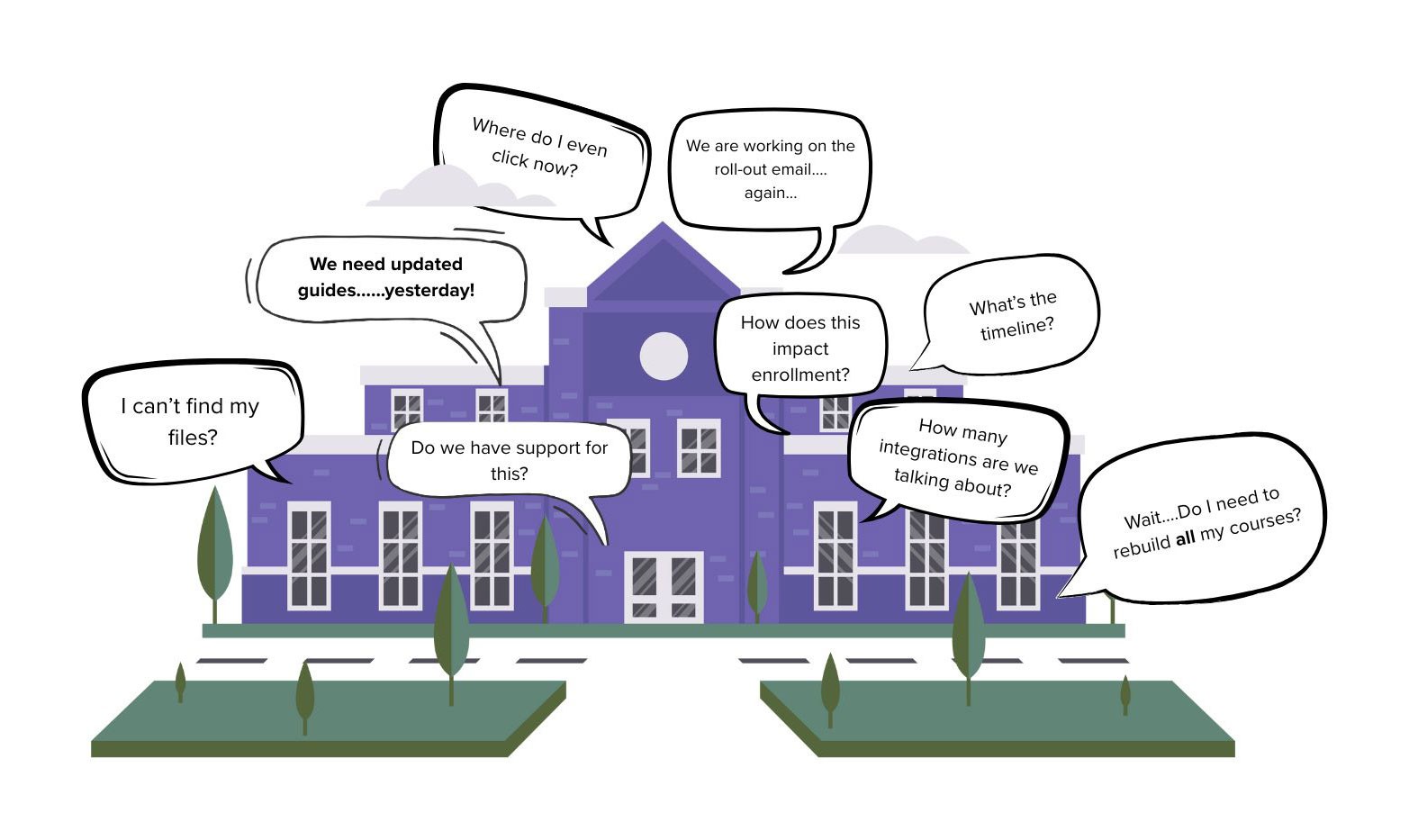What Is Change Management and Why Does It Matter?
Learning Management System (LMS) transitions are among the most visible and disruptive changes a campus can undertake — yet, too often, they're treated as IT projects rather than institution-wide transformations. The key to a successful transition isn't just good tech, it's great change management.
Whether you're rolling out a shiny new tool or rethinking how your institution operates, good change management means leading with intention, coordination, and trust.
In higher education, where shared governance and stakeholder trust are paramount, this process must be intentional, inclusive, and strategic. This post explores why LMS transitions are defining moments for institutions and how human-centered change management can turn risk into opportunity.
These transitions don't happen in a vacuum; they ripple across every corner of campus. To understand what makes these changes so complex (and why change management is non-negotiable), we need to look beyond the platform and into the people and processes it touches.
Why are LMS Transitions a Defining Moment for Institutions?
While LMS transition projects may be framed as system upgrades, they are projects that change, significantly, in how an institution teaches, learns, and supports students. These transitions are among the most anxiety-inducing and high-stakes changes an institution can undertake. Whether switching vendors entirely or undergoing a system redesign, both scenarios demand careful planning and execution. The two most common types of transitions require strategic and tailored change management:
- Platform Migration: Shifting from one LMS to another. This often involves vendor selection, system integration, training, and policy redesign.
- Platform Transformation: Staying with a vendor but shifting to a new environment (e.g., Blackboard Learn to Ultra). While data and relationships may remain, the shift often requires a complete reorientation to new features and workflows.
"Change is not just about software—it's about shifting culture, expectations, and behaviors." – EDUCAUSE Working Group on IT Change Management
Why is Change in Higher Education Complex?
Change in Higher Education is complex because people are. Higher education operates differently from corporate settings. Shared governance, academic freedom, legacy systems, and decentralization mean change moves at the speed of committees. Every shift, especially those involving teaching and learning systems, touches a wide range of people — a whole constellation of voices, needs, and workflows. And few systems connect more of those voices than the LMS.

The LMS is more than just a hub for tests and textbooks. It's the online classroom, but it's also the gradebook, filing cabinet, inbox, community board, and an on-ramp for student success.
That means LMS change affects everyone:
- Faculty must learn new tools, redesign courses, and maintain instructional quality
- Students must adjust to new workflows that impact their learning experience
- IT teams must manage new systems, integration, and support
- Vendors and partners must realign their tools and services
- Leadership and administration must communicate the "why," manage risks, monitor outcomes, and meet milestones
- Staff and advisors must adapt processes tied to enrollment, advising, and compliance
When all these groups are supported through change management, transitions go more smoothly, adoption gains traction, and long-term success becomes more likely. At Ellucian, we've helped institutions through transitions that feel less like disruptions and more like transformations built around the people who matter most.
"Unless the people most affected by a change are part of the process, you are far less likely to succeed." – Huron Consulting Group
How can we Empower Faculty and Students in LMS Transitions?
Faculty and students are immersed in the LMS. When it changes, so does their daily experience. That's why they must be seen as end-users and key partners in the change process.
To build buy-in and ease the transition, emphasize trust, support, and empathy over compliance. Here's what effective change management for LMS transitions should include:
- Engaging faculty champions early to model and mentor change
- Offer hands-on training and just-in-time resources
- Provide clear, student-friendly communication to reduce confusion and anxiety
- Create opportunities for feedback and iteration during rollout
Change shouldn't just happen to people; it should happen with them.
Let's Do This Together!
LMS transitions aren't just tech upgrades. They're defining moments for institutions that reflect how campuses adapt, evolve, and care for their communities. With the right change management strategy — intentional, inclusive, and well-communicated — these shifts can spark growth instead of groans.
At Ellucian, we bring comprehensive higher ed experience to every step of the journey: planning, communication, stakeholder engagement, training, and beyond. We've helped institutions navigate change without losing momentum (or their faculty's goodwill).
Let's make your LMS transition more than just a tech upgrade. Let's make it a story worth sharing. To learn more about our LMS transition support, visit us at Ellucian Teaching & Learning Services or contact us at [email protected].




